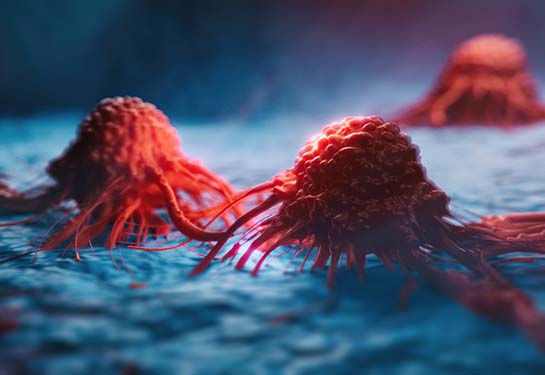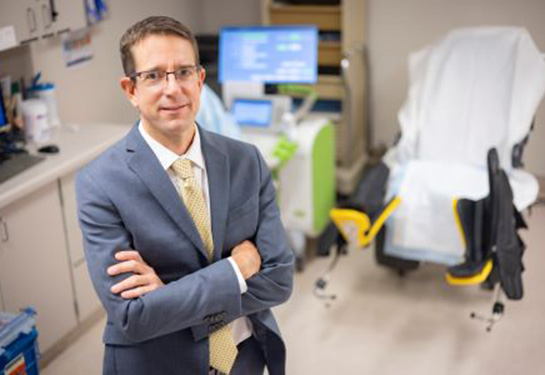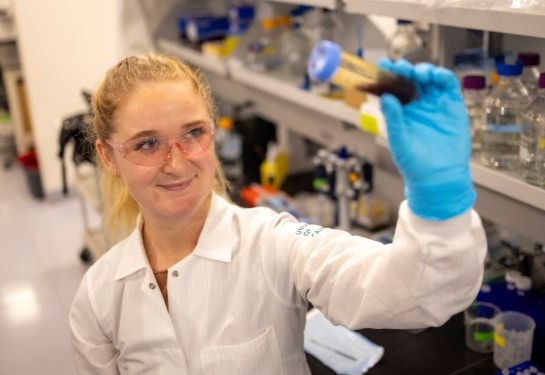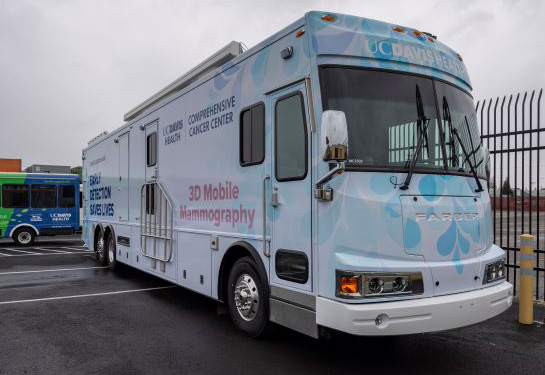On cancer, cholesterol and the circadian rhythm: Unlocking the power of receptor proteins
In a Q&A with Hongwu Chen, professor of biochemistry and molecular medicine at UC Davis Health, we discussed how a special receptor protein known as RORγ impacts cancer growth and cholesterol synthesis. Chen is the director of the Cancer Metabolism Initiative of the UC Davis Comprehensive Cancer Center.
Chen and his team are studying the function of RORγ and other related receptor proteins in the development and progress of different cancers.
What are the receptor proteins and what is their link to cancer?
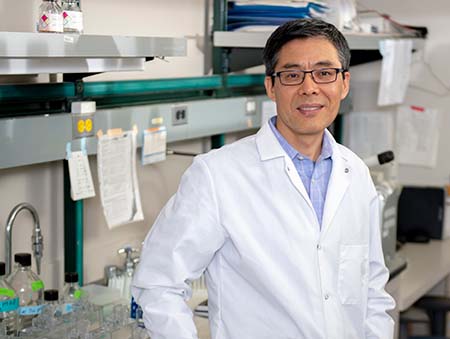
A receptor is a protein that binds to a specific molecule called a ligand. Studies show that some receptor proteins are master regulators of cancer metabolism, or the way in which cancer cells make the energy they need to spread. Receptor proteins can affect cancer on multiple levels and through different mechanisms, such as controlling tumor cholesterol pathways.
RORγ is a receptor protein that directly activates cholesterol biosynthesis in cancer cells. REV-ERBα, another receptor protein, is also connected to cancer development. When REV-ERBα and RORγ’s normal functions are disrupted, they alter gene activities in promoting cancer progression.
How are cholesterol and cancer connected?
Cholesterol is not simply a cell membrane component for normal or cancer cells. It plays a crucial role in membrane signaling through an intricate dynamic communication process. In fact, cholesterol metabolism is one kind of cancer metabolism.
Most solid tumors show hyperactivity in cholesterol biosynthesis and metabolism and have a significantly higher cholesterol content than normal tissues. So, changes in the cholesterol metabolism are considered a major contributor to the progression of many types of cancer, including prostate cancer, lung cancer and estrogen receptor-positive (ER+) or ER-negative breast cancer.
Your work links the disruptions in the body’s biological clock to cancer. Can you tell us about this relationship?
The circadian rhythm, also known as the biological clock, is very important for our body’s normal physiological functions. It controls our sleep and wake patterns, feeding schedules and metabolism. Disruption of this internal clock has been linked to cancer development and progression.
We found that this disruption has something to do with the abnormal functioning of RORγ and REV-ERBα proteins, both of which are key regulators in the circadian rhythm.
Interestingly, RORγ and REV_ERBα proteins can act similarly in a cancer setting but very differently in normal circadian rhythm. They have opposite functions when it comes to the circadian rhythm: where one is activating genes, the other is repressing them.
Your research addresses the use of statins as a possible cancer therapy. How would that work?
Statins are a class of drugs primarily used to prevent cardiovascular diseases caused by high blood cholesterol levels. Statins are widely used and considered relatively safe.

Many studies looked at the relationship of statin use to cancer development or progression. It's quite clear there's a significant negative correlation between statin use and the progression of many cancers. In preclinical studies, scientists found that giving a high dose of statins will kill cancer cells and inhibit tumor growth in mice.
Yet, many clinical trials failed to prove a therapeutic effect of statin drugs in treating tumors when given to cancer patients.
So, why didn’t statin use show a positive effect in cancer clinical trials?
It’s kind of a clinical dilemma. With the safe dose allowed for patients, statin in the tumor will likely cause an activity called negative feedback. This means that the tumor cell will increase the number of enzymes needed for cholesterol production to compensate for the decrease of cholesterol caused by the drug.
In our preclinical model, we saw that inhibiting RORγ receptor can block this statin-induced feedback. This makes statin treatment highly effective in blocking tumor growth and metastasis when combined with an RORγ inhibitor. Interestingly, this combination effect on cholesterol is seen in the tumor and not in the normal mouse liver of the preclinical model.
You propose RORγ inhibitors as potential therapeutics in cancer treatments. What did your studies show?
As a receptor protein, RORγ can bind to ligands of small molecules, making it a very attractive therapeutic target.
It was unexpected for us to find that RORγ inhibitors with different chemical structures display very distinct effects when used to treat different cells. Some RORγ inhibitors, like the ones we designed, are very potent in blocking the RORγ functions in cancer cells and tumors. Yet, they are not so active in affecting the RORγ function in other kinds of cells, such as certain immune cells. Similarly, other inhibitors designed to impact the RORγ function in immune cells seem not to work in cancer cells.
This means we can develop small molecule inhibitors of RORγ with distinct structures that selectively block the abnormal function of RORγ in cancer without significantly affecting its other functions.
How do you see the way forward for testing RORγ in cancer therapy?
I believe RORγ is a great therapeutic target for different kinds of cancer, including advanced forms of breast cancer, lung cancer, pancreatic cancer and prostate cancer. The development of small molecules displaying distinct activity against the abnormal RORγ function will be the way to go.
This is, in essence, a precision medicine type of study, as the inhibitors developed will target precisely a disease-linked functional feature of the RORγ receptor.
Also, finding a drug to combine with the distinct molecules targeting RORγ to achieve highly effective therapy is a future study direction. It might be statins or something else; we don't know at this point. Our deeper understanding of the function of RORγ in cancer will guide us.
Learn more about RORγ in a review article by Chen published in Biochemical Pharmacology.
UC Davis Comprehensive Cancer Center
UC Davis Comprehensive Cancer Center is the only National Cancer Institute-designated center serving the Central Valley and inland Northern California, a region of more than 6 million people. Its specialists provide compassionate, comprehensive care for more than 100,000 adults and children every year and access to more than 200 active clinical trials at any given time. Its innovative research program engages more than 240 scientists at UC Davis who work collaboratively to advance discovery of new tools to diagnose and treat cancer. Patients have access to leading-edge care, including immunotherapy and other targeted treatments. Its Office of Community Outreach and Engagement addresses disparities in cancer outcomes across diverse populations, and the cancer center provides comprehensive education and workforce development programs for the next generation of clinicians and scientists. For more information, visit cancer.ucdavis.edu.

